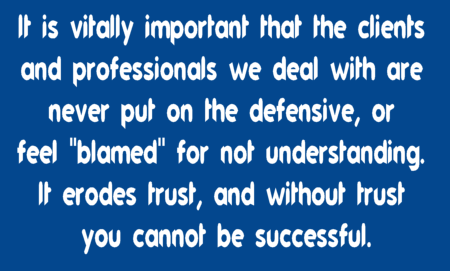That’s quite a title for a blog post, don’t you think? I’ve been working on this one for awhile, and it seems to have taken on a life of its own. In fact, it’s so long, I’ve now divided it into four parts.
Further, you’re about to learn is that I can’t count. I call it the “dirty dozen” because it’s a catchy title and it will compel you to link here to read the post (You’ll read more about this in Part III !). But it’s really a list of 16 (yes, 16!) skills, tasks, and attributes that the most successful advocates are, and employ.
Which of these describe you and your abilities? Which of them don’t? Where do you go from here? Do your own assessment!
Part I: Attributes of Success Health/Patient Advocates and Care Managers
1. Successful advocates must, above all, be trustworthy, and must guide their practices by asking themselves, “Will this client (or potential client) trust me if I _____?” Before, during, and after you are hired you must continually behave as if you are deserving of that trust. Remember, you are being asked to be a part of the most intimate and important parts of clients’ lives – their health and financial well-being. You must command trust, and you must consistently prove that their trust has been well placed by being consistent, responsive, and available when needed.
Remember, too, that your trustworthiness isn’t just important for your relationship with that one client you’re working with (or may work with.) As long as your client believes you are worth their trust, they will share that information with others. Being trustworthy is important not only for your relationship with your current client but for the future of your practice, too.
- Read more: The Birdcage: How to Ruin a First Impression
2. To be successful, you must be a people person. You must have the ability to interact with other people easily – conversations should flow. This includes being respectful, listening carefully, and putting yourself in the shoes of your client.
Also included in the description of being a people person is the attribute of patience. When clients are sick, hurt, in pain, fearful, or feeling threatened, then they are rarely on their best behavior. Some days it will require all the patience any human can muster to put up with them. You may feel as if you have to bite off the end of your tongue. But that’s what the work requires, so being a patient people person is a requirement for your success.
- Read more: A Surefire Way to Drive Older Clients Away
3. The best advocates are empathetic and sympathetic. Many of us come to this work because we’ve had horrible medical experiences of our own – health care or financial devastation due to cost – where we lost a loved one, or were misdiagnosed, or had to learn the system to prevent a loved one from being mistreated or poorly treated, or protected our life savings from the bogus cost of care… We have the utmost of empathy because we’ve been there, and we’ve done that, and we learned our way around as a result.
Others among us have spent a lifetime in a clinical career where we’ve seen the best and the worst of the system, and now we plan to navigate only to the best for our clients.
While you can’t rely solely on those experiences for doing your work successfully, your ability to empathize or sympathize will go a long way toward not only helping you understand your client, but it will also help you to build that necessary trust. (See #1 above.)
4. All successful advocates and care managers are assertive; they have chutzpah. They are not afraid to step into the middle of a problem, and are very specific about their expectations (even when they are being told NO!). Sometimes they are required to FIGHT for their clients, bulldog style. At the very least, they push back as necessary, and they sometimes accomplish the impossible because of it. And while this isn’t how I usually phrase this in writing, especially to a mostly female audience – advocates and care managers must have balls! Yes, there, I typed it.
Unless you are willing to step into the middle of problems and assertively (NOT aggressively) tell providers, hospital employees, insurance representatives, sometimes even family members, and others what you expect, then follow through to be sure your expectations are met, then you will not succeed as a patient advocate or care manager.
- Read more: Chutzpah! Know When it Crosses the Line
- Read more: Step Aside Pollyanna! There’s No Room Here for You
Next week: Part II of The Dirty Dozen of What Makes a Successful Advocate?
LEARN ABOUT APHA MEMBERSHIP | MORE REASONS PATIENTS NEED ADVOCATES | MASTER LIST OF PRACTICE RESOURCES






Just wonderful and so timely. Looking forward to the rest of The Dirty Dozen.